Q&A w/ DIRECTOR, ROBERT GREENWALD and TWO WHISTLEBLOWERS
Written on May 28th, 2013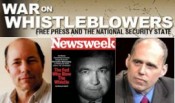 |
Aired: 5/26/13
How difficult is it to be a government whistleblower these days? A dozen years after 9/11, with a former constitutional law professor in the White House, the sad news is that to expose government negligence or illegality is to jeopardize one’s career and life savings.
The newest documentary from producer and director ROBERT GREENWALD and Brave New Films, WAR ON WHISTLEBLOWERS: Free Press and the National Security State highlights the stories of four individuals who felt compelled to reveal acts of government illegality and violations to the U.S. constitution in the military industrial complex in the years following 9/11. In the film, whistleblowers, journalist and experts share what happens when the government punishes those who stand up to demand accountability and defend the constitution. Such actions and the atmosphere they engender has a chilling effect on the speech rights of citizens and the free press. This week I speak about all of this with GREENWALD as well as with two of the courageous whistleblowers featured in the film, THOMAS TAMM and FRANZ GAYL.
www.waronwhistleblowers.com
www.bravenewfilms.com
Q&A w/ DANNY KENNEDY, ROOFTOP REVOLUTION: How Solar Power Can Save Our Economy and the Planet from Dirty Energy
Written on May 13th, 2013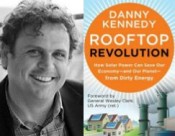 |
Aired: 05/12/13
Is there a revolution coming to your rooftop? While opponents claim solar is expensive, inefficient, and unreliable, in his book ROOFTOP REVOLUTION: How Solar Power Can Save Our Economy And Our Planet From Dirty Energy, DANNY KENNEDY makes clear solar can save money, create jobs, and protect the environment if only politics and perception will get out of the way.
During the recent Presidential campaign, we heard a lot about Solyndra, the solar start-up that received a sizable government loan only to go belly up. Solar’s detractors claim the collapse of Solyndra proves solar is just a hippie pipe dream, but Danny Kennedy, says the truth is quite the opposite. Solyndra failed because it wasn’t able to compete in a red-hot industry, not because solar isn’t ready for prime time.
The industry employs 100,000 people in the United States, twice as many as in 2009 and twice the number of coal miners. In 2011, Warren Buffett invested $2 billion in a solar farm, and General Electric bought a start-up solar manufacturer, announcing, “By 2020 this is going to be at least a $1 billion product line.” Production of solar-generated electricity rose by 45% in the first three quarters of 2010, while electricity from natural gas rose only 1.6% and coal declined by 4.2%. Kennedy argues for a rooftop revolution to break the entrenched power of the coal, oil, nuclear, and natural gas industries and their progress-denying allies.
www.rooftoprevolutionbook.com
www.sungevity.com
Q&A: Mark Mykleby, Natl Security=Sustainability
Written on April 8th, 2013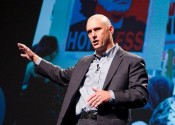 |
Aired: 04/07/13
In the preface to an article entitled A National Strategic Narrative, Anne-Marie Slaughter of Princeton says we need a narrative that confronts some of the following questions, “Where is the United States going in the world? How can we get there? What are the guiding stars that will illuminate the path along the way? We need a story with a beginning, middle, and projected happy ending that will transcend our political divisions, orient us as a nation, and give us both a common direction and the confidence and commitment to get to our destination.” She also writes, “In one sentence, the strategic narrative of the United States in the 21st century is that we want to become the strongest competitor and most influential player in a deeply inter-connected global system, which requires that we invest less in defense and more in sustainable prosperity and the tools of effective global engagement.”
Over time, the best way to shape the force of the future is to invest in the science, technology, education, and training that will equip our soldiers, sailors, airmen, and marines to adapt to an increasingly complex and dynamic environment. The hardware and software we buy and build are secondary to the gray matter we must cultivate now.
When I hear that someone high up in the military is talking seriously about sustainability, I take notice.
www.newamerica.net
Q&A: KEVIN BLEYER – Emmy-winning writer for The Daily Show & Author, ME THE PEOPLE
Written on July 19th, 2012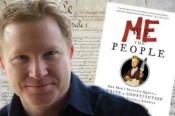 |
Aired 07/15/12
The Supreme Court’s been in the news a lot lately. Several of the nine justices claim to be originalists, assuming to know what the framers meant when they wrote it, and that they meant for us to follow it for the most part as written for the life of the republic. Well. No less an authority than Thomas Jefferson said the Constitution should be rewritten every 19 years.
And my next guest has taken him up on that. KEVIN BLEYER — who’s won Emmys writing for THE DAILY SHOW and has worked on President Obama’s speeches at the White House Correspondents’ Dinners – has done what he calls “a page one rewrite.” Bleyer joins me on Free Forum to talk about his new book, ME THE PEOPLE: One Man’s Selfless Quest to Rewrite the Constitution of the United States of America.
Q&A: MARIA ARMOUDIAN, Journalist/Radio Host
Written on August 12th, 2011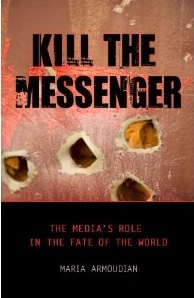 |
Aired 08/08/11
KILL THE MESSENGER emerged from MARIA ARMOUDIAN's studies into the causes of genocide, war, peacemaking, democratization, and the protection of human rights and the environment, while she was working on her Ph.D. at the University of Southern California, as well as during her work as a broadcast journalist and public official. Looking across conflicts and policy successes and failures, she found that media (and media professionals) were among key factors in determining political outcomes, including matters of life and death.
Written in five parts, KILL THE MESSENGER shows how media fomented rage and genocide in Rwanda, the Holocaust and the Bosnian war; how they helped bring peace in the Northern Ireland Conflict and the war in Burundi; how media contributed to democratization and the protection of human rights in South Africa, Taiwan, Mexico, and Senegal, and how they aided both the destruction and rebuilding of democracy in Chile. In its final case study, Kill the Messenger explores the media's role in the fate of the world, as journalists disentangle the issue of climate change for the public.
The book's forward was written by Tom Hayden.
